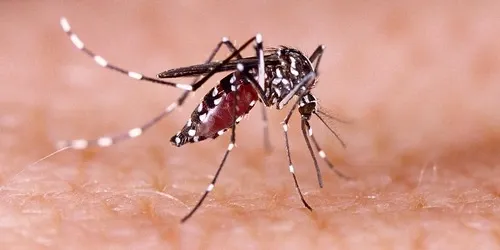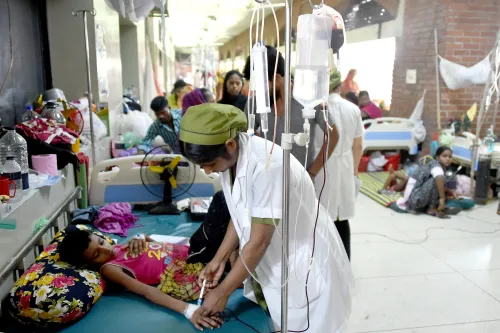Are dengue fever cases rising in Vietnam?

Synopsis
Key Takeaways
- Dengue cases have surged dramatically in Vietnam.
- Health authorities urge public action against mosquito breeding.
- Most dengue infections are asymptomatic or mild.
- Severe dengue requires hospitalization.
- Preventive measures are crucial during rainy seasons.
Hanoi, July 28 (NationPress) — Reports from the daily newspaper Nhan Dan indicate a significant spike in dengue fever cases within Vietnam's two largest urban areas, Ho Chi Minh City and the capital Hanoi. Last week alone, Hanoi documented 72 fresh infections, which is a twofold increase compared to the previous week, raising the cumulative total to 475 cases and 15 outbreak clusters since the start of 2025, as per the city's Centre for Disease Control.
Meanwhile, in Ho Chi Minh City, over 15,500 dengue cases and 10 fatalities have been reported by mid-July, reflecting a staggering 157 percent increase year-on-year.
Health officials are calling on the public to take measures to eradicate mosquito breeding sites and remain alert, especially given the ongoing rainy and humid weather, according to Xinhua.
The World Health Organization classifies dengue (often referred to as break-bone fever) as a viral disease transmitted from mosquitoes to humans, predominantly thriving in tropical and subtropical regions.
Although most individuals infected with dengue experience no symptoms, those who do may suffer from high fever, headaches, body aches, nausea, and skin rashes. The majority recover within 1–2 weeks, although some may develop severe dengue, requiring hospitalization.
Preventing dengue involves avoiding mosquito bites, particularly during daylight hours.
As there is currently no specific antidote for dengue, treatment typically focuses on pain management.
In rare instances, dengue can escalate to severe levels and result in death.
The global incidence of dengue has escalated dramatically in recent decades, with the WHO reporting an increase from 505,430 cases in 2000 to 5.2 million in 2019. A large proportion of cases are asymptomatic or mild and often self-managed, leading to underreporting. Many cases are also misdiagnosed as other febrile illnesses.
In 2023, the highest number of dengue cases was recorded, impacting over 80 countries across all WHO regions. The year has seen an unprecedented surge, with over 6.5 million cases and more than 7,300 deaths attributed to dengue.









